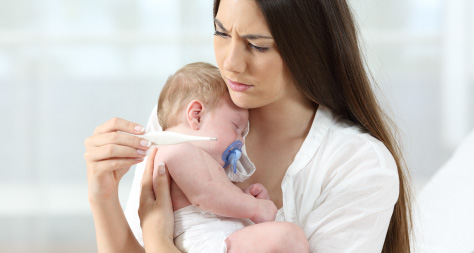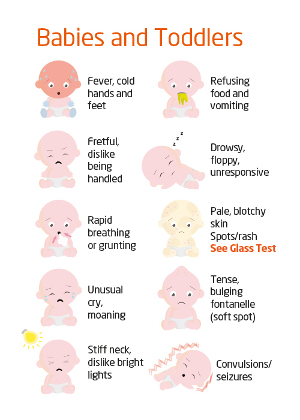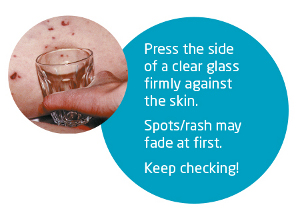Knowing the common signs and symptoms of meningitis and septicaemia saves lives so it's important you know what to look for.
Babies and young children are the most at risk, with around half of all cases occurring in the under 5s. Despite vaccines being available for some types of meningitis, there are still thousands of cases in the UK every year.

What is Meningitis?
Meningitis is inflammation of the membranes that surround and protect the brain and spinal cord. Many different organisms can cause meningitis, but the most common are viruses and bacteria.
Viral meningitis can make people very unwell but is rarely life-threatening. Most people make a good recovery, but sufferers can be left with after-effects such as headaches, tiredness and memory loss.
Bacterial meningitis can kill, so urgent medical attention is essential. Most people do make a good recovery, but many are left with debilitating after-effects such as deafness, brain damage and where septicaemia occurs, limb loss.
Meningococcal septicaemia
Meningococcal bacteria are the most common cause of bacterial meningitis in the UK. They can cause both meningitis and septicaemia (blood poisoning), which people often have together. It is important to be aware of all the signs and symptoms.
What are the signs and symptoms of Meningitis?
Symptoms cards are now included in Bounty Newborn packs, but you can also download the Meningitis Now free app.
Meningitis and septicaemia often happen together. Be aware of all the signs and symptoms.
Symptoms can appear in any order, some may not appear at all.
Signs and symptoms of meningitis in babies and toddlers

Signs and symptoms of meningitis in children and adults

The glass test
People with septicaemia may develop a rash of tiny ‘pin pricks’ which can develop into purple bruising.
This rash doesn't fade under pressure so it's worth doing the glass test!

- Fever with spots/rash that do not fade under pressure is a medical emergency
- Do not wait for a rash, if someone is ill and getting worse get medical help immediately
- On dark skin the spots/rash can be more difficult to see. Do not wait for a rash. Be aware of all the signs and symptoms
Trust your instincts – get medical help immediately
If you are concerned it could be meningitis or septicaemia, you can:
Call NHS 111 or your GP.
In an emergency you can:
- Dial 999 for an ambulance
- Go to your nearest accident and emergency department
Describe the symptoms and say you think it could be meningitis or septicaemia.
Early diagnosis can be difficult. If you have had advice and are still concerned, get medical help again.
Treatment
If meningitis is suspected rapid admission to hospital is vital. Bacterial meningitis and septicaemia need urgent treatment with antibiotics, if recognised and treated early, they are less likely to become life-threatening or cause serious after-effects.
In hospital other treatment, procedures and investigations will be carried out depending on the condition of the patient.
Antibiotics are not effective against viruses, and there is no specific treatment for most cases of viral meningitis. Patients need to be hydrated with fluids, given pain relief and allowed to rest in order to recover.
Prevention
Vaccines are available to prevent some types of meningitis and have dramatically reduced the number of cases. Many of these vaccines are part of the Childhood Immunisation Programme and will be offered to all babies from 2 months of age. The
MenB vaccine is part of the Childhood Immunisation programme.
Meningitis Now is the UK’s leading meningitis charity. For more information about meningitis you can:
Call Meningitis Helpline, Freephone 0808 80 10 388 (UK)